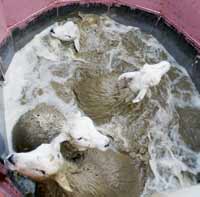NFU to probe history of OP poisoning

The NFU is to open its archives in a bid to unearth information that may help farmers who believe they have been poisoned by organophosphate (OP) pesticides.
NFU president Peter Kendall agreed to the unprecedented move following an impassioned plea by OP campaigner and Lancashire county chairman Tom Rigby during the union’s council meeting on Tuesday (26 January).
Read our case study on Peter Dixon, a farmer from Diss, Norfolk, who has been diagnosed with (OP) poisoning |
|---|
Derived from phosphoric acid, OPs remain regarded as one of the most acutely toxic pesticides. But their use – especially in sheep dip – has been blamed for cases of poisoning, respiratory failure and even death among farmers.
Mr Rigby said: “Twenty years ago, farmers had to dip their sheep. It was compulsory. It was done under police supervision. It was done with products and formulations we now know were not safe. The protection gear was inadequate.”
As many as 15,000 farmers who used OPs could have seen their lives shortened through no fault of their own, Mr Rigby told NFU council delegates. He is due to meet Health Secretary Andy Burnham to discuss the issue on Friday (29 January).
Ministerial reshuffles meant a government seminar on OP safety originally scheduled to take place in 2002 had still not taken place, said Mr Rigby. With a general election looming, it now looked like Mr Burnham too might be unable to help.
“If we are an organisation that prides ourselves in being guided by the science rather than hampered by the politicians, we should have stood up at sometime in the past eight years and said this is simply not good enough.”
NFU archives might reveal whether the government was aware of the dangers of OP pesticides, said Mr Rigby. They might also show whether government work examining organophosphate safety had been properly completed.
Union officials will now trawl through NFU records stretching back almost two decades. Of particular interest are likely to be minutes of meetings with civil servants prior to the relaxation of rules requiring mandatory sheep dipping.
Mr Kendall said he was happy to look at the union’s records. The NFU had an obligation to members past and present to show it had nothing to hide. “There is no indication that the NFU was ever involved in any sort of cover up,” he said.

